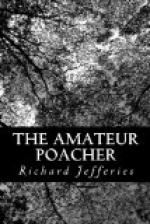The butler was a little merry fellow, extremely fond of a gun, and expert in using it. He seemed to have nothing to do but tell tales and sing, except at the rare intervals when some of the family returned unexpectedly. The keeper was always up there in the kitchen; he was as pleasant and jovial as a man could well be, though full of oaths on occasion. He was a man of one tale—of a somewhat enigmatical character. He would ask a stranger if they had ever heard of such-and-such a village where water set fire to a barn, ducks were drowned, and pigs cut their own throats, all in a single day.
It seemed that some lime had been stored in the barn, when the brook rose and flooded the place; this slaked the lime and fired the straw, and so the barn. Something of the same kind happens occasionally on the river barges. The ducks were in a coop fastened down, so that they could not swim on the surface of the flood, which passed over and drowned them. The pigs were floated out of the sty, and in swimming their sharp-edged hoofs struck their fat jowls just behind the ear at every stroke till they cut into the artery, and so bled to death. Where he got this history from I do not know.
One bright October morning (towards the end of the month) Dickon drove me over to the old place with his fast trotter—our double-barrels hidden under some sacks in the trap. The keeper was already waiting in the kitchen, sipping a glass of hot purl; the butler was filling every pocket with cartridges. After some comparison of their betting-books, for Dickon, on account of his acquaintance with the training establishments, was up to most moves, we started. The keeper had to send a certain number of pheasants and other game to the absent family and their friends every now and then, and this duty was his pretext. There was plenty of shooting to be got elsewhere, but the spice of naughtiness about this was alluring. To reach that part of the wood where it was proposed to shoot the shortest way led across some arable fields.
Fieldfares and redwings rose out of the hedges and flew away in their peculiarly scattered manner—their flocks, though proceeding in the same direction, seeming all loose and disordered. Where the ploughs had been at work already the deep furrows were full of elm leaves, wafted as they fell from the trees in such quantities as to make the groove left by the share level with the ridges. A flock of lapwings were on the clods in an adjacent field, near enough to be seen, but far beyond gunshot. There might perhaps have been fifty birds, all facing one way and all perfectly motionless. They were, in fact, watching us intently, although not apparently looking towards us: they act so much in concert as to seem drilled. So soon as the possibility of danger had gone by each would begin to feed, moving ahead.
The path then passed through the little meadows that joined the wood: and the sunlight glistened on the dew, or rather on the hoar frost that had melted and clung in heavy drops to the grass. Here one flashed emerald; there ruby; another a pure brilliance like a diamond. Under foot by the stiles the fallen acorns crunched as they split into halves beneath the sudden pressure.




